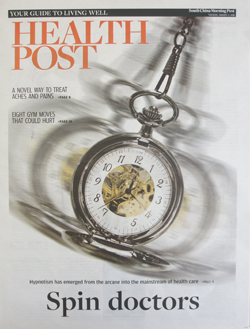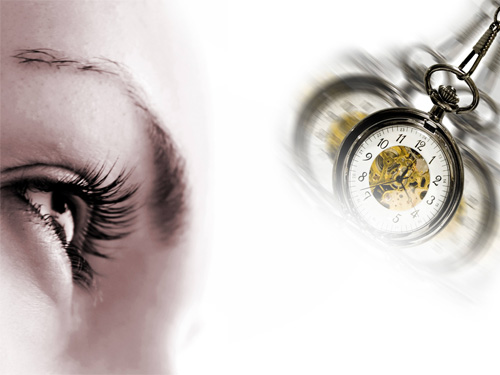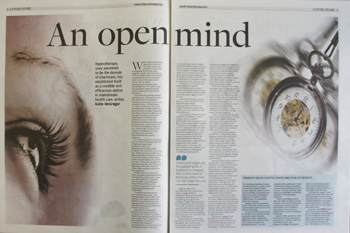傳媒採訪主頁
An open mind |
Hypnotherapy, once perceived to be the domain of charlatans, has established itself as a credible and efficacious option in mainstream health care |
 Katie McGregor
Katie McGregor
Aug 02, 2011 (from South China Morning Post)
With celebrity hypnotists taking their shows to Las Vegas, it puts the practice on a par with sawing ladies in half and other magician's tricks. But as far back as 1955, the British Medical Association recognised hypnotism as being of value, or even "the treatment of choice", for "so-called psychosomatic disorders and psychoneurosis". It could be used, the association claimed, for pain relief in surgical and even dental operations.
Scepticism has perhaps fuelled much research on the matter and, in 2001, the British Psychological Society commissioned a panel to do a research review. In their report, The Nature of Hypnosis, the panel concluded that enough studies had shown that the inclusion of hypnotic procedures may be beneficial in the management and treatment of a wide range of conditions and problems encountered in the practice of medicine, psychiatry and psychotherapy. It also warned that in forensic investigation, hypnosis may result in false memories and misplaced confidence in recall, indicating that indeed the hypnotised mind is open to suggestion.
In Hong Kong, Dr Lien Zun Rene Pius, president of Hong Kong Guild of Hypnotherapists and Psychotherapists, says hypnotherapy is more widely accepted than it was five or six years ago. "People are more positive and open to the idea of hypnosis as there is more information in the media, and the internet helps a lot as well," Lien says. "In the past, people saw hypnosis as the last resort, but now they make it their first or second choice when seeking a solution to these problems."
In 2005, there were about 30 hypnotherapists practising full time in Hong Kong. Today there are just over 100 practitioners registered with the guild. Hypnotherapist Fiona McKeand believes the increased competition is good as it makes hypnotherapy more mainstream.
"You treat someone once or twice and they are cured," says hypnotherapist Julien Willm, who practises at Dr Susan Jamieson & Holistic Central Medical Practice. "But quite often, the problem is a little embarrassing so people won't broadcast their cure."
One of the less "personal" problems frequently treated is smoking. One of Willm's patients, a banker who has been smoke-free for nine months, says: "I had tried to stop smoking on numerous occasions and it took two recommendations by friends for me to try hypnotherapy. I was very cynical and expected a swinging watch and that kind of hocus pocus. But it was quite a sensible session and my opinion changed straight away. It's not a miracle cure but it greatly increased my willpower, and the results speak for themselves. I certainly have an increased respect for the power of the subconscious."
This patient, whose name has been withheld for patient confidentiality reasons, was so impressed with the results that he also sought Willm's help for public speaking anxiety. Again, it was a success.
Other behavioural conditions that are treated successfully with hypnotherapy include claustrophobia and other fears, weight management, stress and anxiety, insomnia and issues with self-confidence.
 The emphasis of hypnotherapy should be on "therapy", says Dr Melanie Bryan, a clinical psychologist who uses hypnosis as part of her practice at Mind Matters. "Hypnosis is an excellent tool, but it's not a treatment and it shouldn't exist outside of therapy. You can't just go on a weekend course and then mess around with people's minds. You need to find out the reasons behind the behaviour before being able to make effective suggestions to the patient's subconscious." Apart from the typical behavioural problems, she also specialises in relationship counselling using hypnosis.
The emphasis of hypnotherapy should be on "therapy", says Dr Melanie Bryan, a clinical psychologist who uses hypnosis as part of her practice at Mind Matters. "Hypnosis is an excellent tool, but it's not a treatment and it shouldn't exist outside of therapy. You can't just go on a weekend course and then mess around with people's minds. You need to find out the reasons behind the behaviour before being able to make effective suggestions to the patient's subconscious." Apart from the typical behavioural problems, she also specialises in relationship counselling using hypnosis.
While the efficacy of hypnotherapy does depend on a patient's suggestibility or willingness, the experience of the therapist is clearly important. In Hong Kong, the guild awards members "letters" indicating their level of experience. The basic level, "licenciate", would be competent to deal with difficulties like exam fears and smoking cessation. At the top end of the scale are those trained in psychotherapy, who could deal with more complex issues.
But the brain not only governs behaviour, it is also where the pain stimulus is "felt" or processed. Recent studies have shown that when there is a pain stimulus, receptors are triggered in different parts of the brain including the area that processes our emotions, giving rise to a new understanding about the subjective nature of pain. Hypnotherapy is credited with helping patients not only manage pain relief, but also manage the stress that is either caused by pain or by the anticipation of pain.
McKeand explains some of the techniques used to manage pain: "A therapist might ask the patient while in hypnosis to imagine the control room of the brain where they can dial down the pain, or imagining pain as a block of ice that fades in colour and melts away. The subconscious mind believes what you tell it, particularly if that suggestion is repeated." These techniques also work for tuning down cravings or anxiety.
Willm coached his wife through labour using hypnotherapy. He says: "My wife is terrified of all things medical and although in the end she needed an epidural for an emergency Caesarean section, she sailed through the whole process with a smile on her face."
Hypnotherapy helps patients better tolerate treatments where pharmaceutical pain relief is not always appropriate, or to help reduce the dosage of pain-relief drugs during a procedure. This includes helping cancer patients endure their radiotherapy or chemotherapy, and helping child burn victims cope with the stress of wound cleaning during the healing period. "Stress amplifies the pain," says McKeand.
Hypnotherapy can also reduce or prevent flare-ups of diseases or situations thought to be worsened by stress, such as inflammatory bowel disease. In the United States, clinical health psychologist Laurie Keefer, associate professor of medicine and director of the centre for psychosocial research in gastroenterology at Northwestern University in Chicago, says: "We know from our recent research ... that hypnotherapy, in combination with quality medical care, could significantly improve outcomes in inflammatory bowel disease.
"There is evidence from other chronic diseases including cancer, HIV/Aids, irritable bowel syndrome, and chronic pain that hypnotherapy can have an immediate and positive impact on pain reduction, immune function and possibly inflammatory cytokine secretion, wound healing, recovery time after surgery, gut motility and stress.
"Our research suggests that hypnosis boosts self-efficacy, meaning that patients feel more in control of their disease and are in turn more proactive around managing it."
 THERAPY HELPS SCEPTIC OVERCOME FEAR OF HEIGHTS
THERAPY HELPS SCEPTIC OVERCOME FEAR OF HEIGHTS
The US National Institutes of Health describes hypnosis as a state of mind in which the individual is highly focused, relatively unaware of his or her surroundings, and possibly more able to accept and use therapeutic suggestions. People vary in their responsiveness, or susceptibility, while under hypnosis.
Guiding a client into hypnosis is known in the trade as induction and, hypnotherapists agree, it's easy to do with a bit of training.
The most commonly used method is to simply relax the patient through progressive muscle relaxation, suggesting images, and generally distracting the busy conscious mind until, as hypnotherapist Fiona McKeand describes it, "the face slackens and the patient gets a `look'. Sometimes it's necessary to give the conscious mind something to do if it is too busy," she says. Such tasks might include counting down or eye fixation techniques such as watching a pendulum.
I tried a hypnotherapy session with Julien Willm to confront my fear of heights. Although my research had made me less sceptical, I was still worried that I wouldn't be able to relax enough and have to fake a hypnotic state so as not to embarrass my therapist.
However, Willm assured me I could do no wrong since there was nothing for me to do. He said that I might hear everything he said or just a background burbling. He explained that in fact the hardest people to hypnotise were those who were exhausted or taking medication, as they might simply fall asleep.
I lay down and relaxed. I think I heard much of what Willm said to me but I can't really remember. Being hypnotised is just part of the session. A therapist will discuss your issues with you beforehand so that he or she can work out how best to talk to your subconscious.
A day later I tested Willm's work. Pacific Place's upper-level glass barriers have always been a problem for me. If I walked too close to the edge my stomach lurched, I'd get light-headed and feel as if I might suddenly flip over the edge. This time, I felt nothing.
更多健康資料 http://www.rene-a.net